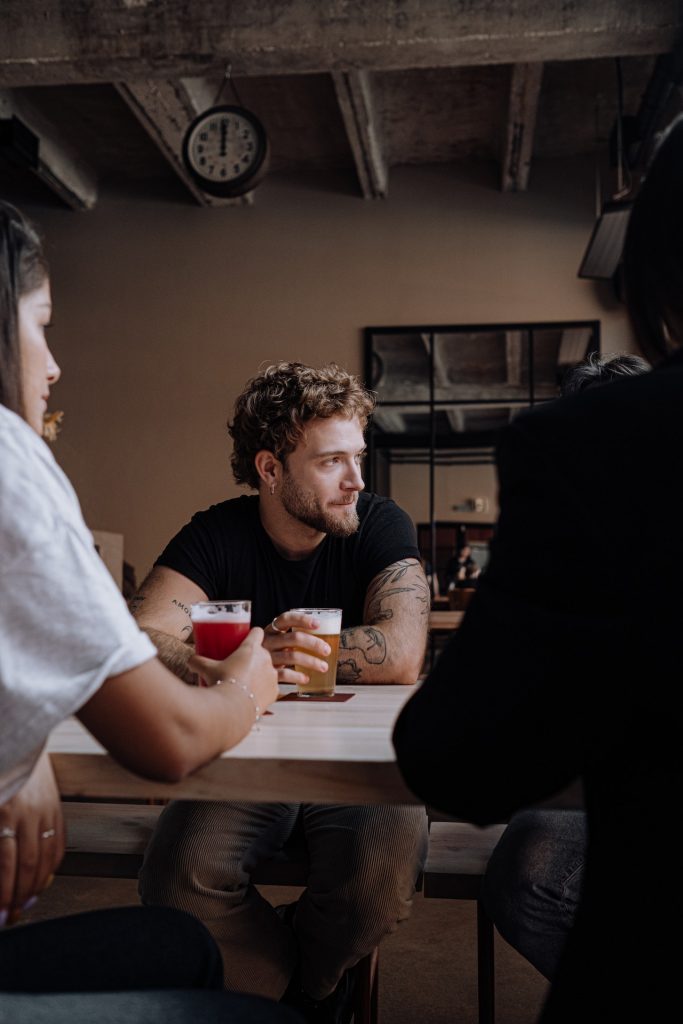The Truth About Liquid Courage: Finding Confidence Without Alcohol
Have you ever felt like you can’t be yourself without alcohol? Or that you’re only able to beat social anxiety with the help of liquid courage?
You’re certainly not alone. An estimated 63% of adults in the U.S. drink, and many do so to feel more relaxed while socializing. But how does drinking affect our self-esteem as a whole? Is alcohol a true confidence booster, or does it make us worse off in the end?
Below, we’ll dive into alcohol’s effects on confidence, the truth behind liquid courage, and tips to help you become more self-assured without it.
What Does It Mean to Have “Liquid Courage”?

In a nutshell, the term “liquid courage” refers to the confidence boost that can come from alcohol.
For most people, just a drink or two can bring on mild euphoria and stress relief. But as you continue to drink, you may forget about insecurities or other worries that would typically make you shy or reserved. These effects are why people often become more extroverted while drinking—and why so many people use alcohol to socialize.
If you’re prone to using liquid courage, you might take a sip every time you talk to a date, meet new friends, or talk to strangers at a party. These activities can be nerve-racking for almost anyone, but alcohol can make it easier to face them with less anxiety (at least in the moment).
Where Does the Phrase “Liquid Courage” Come From?
Liquid courage’s meaning is linked to “Dutch Courage,” a phrase with a few possible origins.
One possibility is that “Dutch courage” was used to describe English soldiers drinking gin, a Dutch spirit, to ease anxiety before battle. However, others believe it came from sailors who would drink before getting into fights. In either case, it was used to describe the out-of-place (and sometimes foolish) confidence that alcohol is famous for.
Why Do I Get More Confident When I Drink?
So, why does alcohol make you confident?
From the start, it reduces your inhibitions and slows down your ability to process your surroundings. This curbs your awareness of potential social risks—like awkwardness or rejection. In turn, it can lead to you feeling friendlier and more outgoing toward others.
Beyond that, it activates your brain’s reward system and boosts dopamine. This neurotransmitter is associated with euphoria, motivation, and pleasure—and all of these feel-good emotions can add to an elevated sense of confidence.
Coupled with alcohol’s ability to relieve stress, this can all make you feel more at ease when talking to others. However, these effects don’t always paint the whole picture when it comes to alcohol’s impact on self-esteem.
Does Alcohol Actually Give You Confidence?
So, does alcohol give you real confidence? In short, no—the sense of self-assurance you feel while drunk is a simple result of the changes happening in your brain and body. In other words, alcohol’s effects are fleeting, and liquid courage only lasts as long as the intoxication does.

In addition, you might find that you feel even worse once the booze wears off. According to the Anxiety & Depression Association of America, you can end up more anxious, irritable, or depressed within a few hours after your last drink. This is known as hangxiety, and it’s one of the reasons you might feel pretty terrible after a night out.
So even though drinking can make you feel good in the moment, it can’t ever provide true self-esteem. And in some cases, it can actually undermine your ability to feel positively about yourself.
In contrast, real confidence is an inner self-assuredness that sticks around even without substances. And if it’s not something that comes naturally to you, that’s okay. Confidence is a skill that you can grow and improve upon by building trust in yourself.
How To Be Confident Without Alcohol
As we mentioned above, it’s possible to bring your confidence up by learning to trust in yourself. But how do you do that? Here are five simple habits that you can implement today:
- Use positive self-talk. If you’re like many who struggle with anxiety, you might have pessimistic thoughts without realizing it. To combat this, practice speaking to yourself more kindly on a daily basis.
- Intentionally socialize without drinking. If you’ve always used alcohol as a socialization aid, try hanging with friends while sober. This is the best way to practice feeling comfortable and confident around others.
- Don’t be afraid to make mistakes. We all say stupid things sometimes, and that’s normal. The good news is that everyone does it, and no one’s expecting you to be perfect.
- Practice self-care. Activities like exercise, meditation, and eating well can help you develop a sense of faith in yourself and your abilities.
- Remind yourself that others’ opinions of you do not matter. It’s human to want to be liked, but it’s vital not to put your self-esteem into the hands of others. Remember that what ultimately matters is how you feel about yourself.
More Support for Building Confidence Without Liquid Courage
If you’re dependent on liquid courage and can’t seem to cut back, you’re not alone. Many people struggle with self-esteem at some point—and it can be especially tough when alcohol has become a regular part of your routine. Fortunately, you can arm yourself with support through online programs like Ria Health.
Ria is a program built for anyone who wants to change their relationship with drinking, regardless of whether you identify as an alcoholic. By signing up, you’ll gain access to recovery coaching, anti-craving prescriptions, and more—all from your smartphone.
Book a call today to get started.
Will insurance cover treatment? Verify Coverage
Have Questions? Call (800) 504-5360



